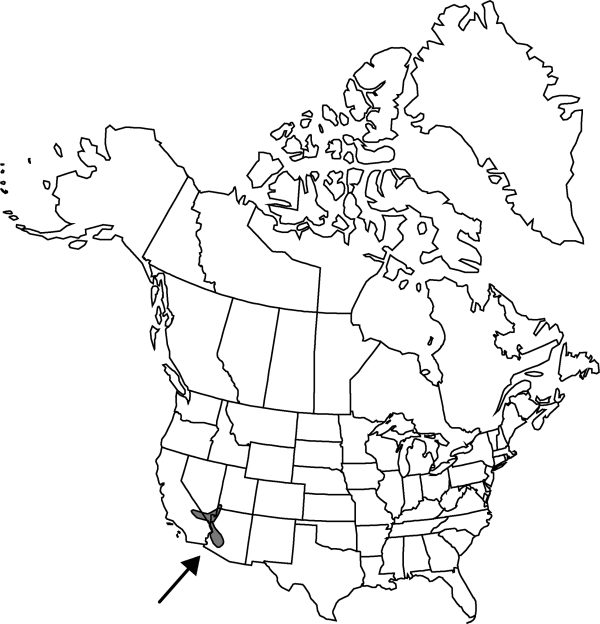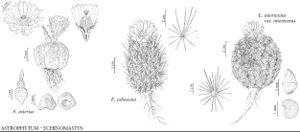Difference between revisions of "Echinomastus johnsonii"
Calif. Cact., 75. 1935.
FNA>Volume Importer |
imported>Volume Importer |
||
| (7 intermediate revisions by 2 users not shown) | |||
| Line 7: | Line 7: | ||
|year=1935 | |year=1935 | ||
}} | }} | ||
| − | |basionyms={{Treatment/ID/ | + | |special_status={{Treatment/ID/Special_status |
| + | |code=F | ||
| + | |label=Illustrated | ||
| + | }}{{Treatment/ID/Special_status | ||
| + | |code=E | ||
| + | |label=Endemic | ||
| + | }} | ||
| + | |basionyms={{Treatment/ID/Basionym | ||
|name=Echinocactus johnsonii | |name=Echinocactus johnsonii | ||
|authority=Parry ex Engelmann | |authority=Parry ex Engelmann | ||
| + | |rank=species | ||
| + | |publication_title=in S. Watson, Botany (Fortieth Parallel), | ||
| + | |publication_place=117. 1871 (as johnsoni) | ||
}} | }} | ||
|synonyms={{Treatment/ID/Synonym | |synonyms={{Treatment/ID/Synonym | ||
|name=Echinomastus johnsonii var. lutescens | |name=Echinomastus johnsonii var. lutescens | ||
|authority=(Parish) Wiggins | |authority=(Parish) Wiggins | ||
| − | }}{{Treatment/ID/Synonym | + | |rank=variety |
| + | }} {{Treatment/ID/Synonym | ||
|name=Neolloydia johnsonii | |name=Neolloydia johnsonii | ||
|authority=(Parry ex Engelmann) N. P. Taylor | |authority=(Parry ex Engelmann) N. P. Taylor | ||
| − | }}{{Treatment/ID/Synonym | + | |rank=species |
| + | }} {{Treatment/ID/Synonym | ||
|name=Sclerocactus johnsonii | |name=Sclerocactus johnsonii | ||
| − | |authority= | + | |authority= |
| + | |rank=species | ||
}} | }} | ||
|hierarchy=Cactaceae;Cactaceae subfam. Cactoideae;Echinomastus;Echinomastus johnsonii | |hierarchy=Cactaceae;Cactaceae subfam. Cactoideae;Echinomastus;Echinomastus johnsonii | ||
| Line 28: | Line 41: | ||
}}<!-- | }}<!-- | ||
| − | --><span class="statement" id="st- | + | --><span class="statement" id="st-undefined" data-properties=""><b>Stems </b>10–25 × 7–15 cm; ribs (13–)18–21; areoles (14–)21–26 mm apart along ribs; areolar glands present at least seasonally. <b>Spines</b> 13–24 per areole, pale yellow to grayish lavender to maroon; radial spines 9–16 per areole; abaxial (shortest) radial spine 6–19 × (0.2–)0.4–0.6 mm; adaxial and lateral (longest) radial spines ca. 27–40 mm; central spines 4–9 per areole, present at all ages, 27–41 × (0.7–)1.1–1.4 mm; longest central spine straight to strongly decurved; abaxial central spine porrect, ca. 27–40 mm Flowers 4–6.5 × 4–7.7 cm; inner tepals yellow or pink to magenta, basal portions blotched with maroon, 2.5–3.7 × 1–1.8 cm; stigma lobes yellowish white to green. <b>Fruits</b> dehiscent only along single, longitudinal split, ± spheric, 17–18 mm. <b>2n</b> = 22.</span><!-- |
-->{{Treatment/Body | -->{{Treatment/Body | ||
| + | |phenology=Flowering (Feb-)Mar–May; fruiting Apr–Jun. | ||
|habitat=Mojave desert scrub and upper edge of Sonoran desert scrub, rocky slopes, gravelly hills | |habitat=Mojave desert scrub and upper edge of Sonoran desert scrub, rocky slopes, gravelly hills | ||
|elevation=500-1400 m | |elevation=500-1400 m | ||
|distribution=Ariz.;Calif.;Nev.;Utah. | |distribution=Ariz.;Calif.;Nev.;Utah. | ||
| − | |discussion=<p>Echinomastus johnsonii varies geographically in both flower and spine color. The yellow-flowered plants have been named E. johnsonii var. lutescens. The pink-flowered plants occur in separate populations, as far as is known, to the north of the yellow-flowered plants, but the interface between the two forms is poorly understood.</p> | + | |discussion=<p><i>Echinomastus johnsonii</i> varies geographically in both flower and spine color. The yellow-flowered plants have been named <i>E. johnsonii</i> var. lutescens. The pink-flowered plants occur in separate populations, as far as is known, to the north of the yellow-flowered plants, but the interface between the two forms is poorly understood.</p> |
|tables= | |tables= | ||
|references= | |references= | ||
| Line 43: | Line 57: | ||
-->{{#Taxon: | -->{{#Taxon: | ||
name=Echinomastus johnsonii | name=Echinomastus johnsonii | ||
| − | |||
|authority=(Parry ex Engelmann) E. M. Baxter | |authority=(Parry ex Engelmann) E. M. Baxter | ||
|rank=species | |rank=species | ||
| Line 50: | Line 63: | ||
|basionyms=Echinocactus johnsonii | |basionyms=Echinocactus johnsonii | ||
|family=Cactaceae | |family=Cactaceae | ||
| + | |phenology=Flowering (Feb-)Mar–May; fruiting Apr–Jun. | ||
|habitat=Mojave desert scrub and upper edge of Sonoran desert scrub, rocky slopes, gravelly hills | |habitat=Mojave desert scrub and upper edge of Sonoran desert scrub, rocky slopes, gravelly hills | ||
|elevation=500-1400 m | |elevation=500-1400 m | ||
| Line 56: | Line 70: | ||
|publication title=Calif. Cact., | |publication title=Calif. Cact., | ||
|publication year=1935 | |publication year=1935 | ||
| − | |special status= | + | |special status=Illustrated;Endemic |
| − | |source xml=https:// | + | |source xml=https://bitbucket.org/aafc-mbb/fna-data-curation/src/2e0870ddd59836b60bcf96646a41e87ea5a5943a/coarse_grained_fna_xml/V4/V4_362.xml |
|subfamily=Cactaceae subfam. Cactoideae | |subfamily=Cactaceae subfam. Cactoideae | ||
|genus=Echinomastus | |genus=Echinomastus | ||
|species=Echinomastus johnsonii | |species=Echinomastus johnsonii | ||
| − | |||
| − | |||
| − | |||
| − | |||
| − | |||
| − | |||
| − | |||
| − | |||
| − | |||
| − | |||
| − | |||
| − | |||
| − | |||
| − | |||
| − | |||
| − | |||
| − | |||
| − | |||
| − | |||
| − | |||
| − | |||
| − | |||
| − | |||
| − | |||
| − | |||
| − | |||
| − | |||
| − | |||
| − | |||
| − | |||
| − | |||
| − | |||
| − | |||
| − | |||
| − | |||
| − | |||
| − | |||
}}<!-- | }}<!-- | ||
-->[[Category:Treatment]][[Category:Echinomastus]] | -->[[Category:Treatment]][[Category:Echinomastus]] | ||
Latest revision as of 22:58, 5 November 2020
Stems 10–25 × 7–15 cm; ribs (13–)18–21; areoles (14–)21–26 mm apart along ribs; areolar glands present at least seasonally. Spines 13–24 per areole, pale yellow to grayish lavender to maroon; radial spines 9–16 per areole; abaxial (shortest) radial spine 6–19 × (0.2–)0.4–0.6 mm; adaxial and lateral (longest) radial spines ca. 27–40 mm; central spines 4–9 per areole, present at all ages, 27–41 × (0.7–)1.1–1.4 mm; longest central spine straight to strongly decurved; abaxial central spine porrect, ca. 27–40 mm Flowers 4–6.5 × 4–7.7 cm; inner tepals yellow or pink to magenta, basal portions blotched with maroon, 2.5–3.7 × 1–1.8 cm; stigma lobes yellowish white to green. Fruits dehiscent only along single, longitudinal split, ± spheric, 17–18 mm. 2n = 22.
Phenology: Flowering (Feb-)Mar–May; fruiting Apr–Jun.
Habitat: Mojave desert scrub and upper edge of Sonoran desert scrub, rocky slopes, gravelly hills
Elevation: 500-1400 m
Distribution

Ariz., Calif., Nev., Utah.
Discussion
Echinomastus johnsonii varies geographically in both flower and spine color. The yellow-flowered plants have been named E. johnsonii var. lutescens. The pink-flowered plants occur in separate populations, as far as is known, to the north of the yellow-flowered plants, but the interface between the two forms is poorly understood.
Selected References
None.
